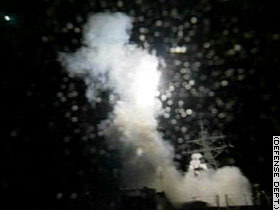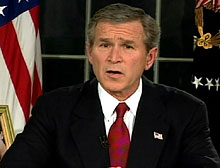WASHINGTON (CNN) -- President Bush announced Wednesday night he has ordered the coalition attack on Iraq to begin.
"American and coalition forces are in the early stages of military operations to disarm Iraq, to free its people and to defend the world from grave danger," Bush said


He said the first strikes were against "selected targets of military
importance," including what Pentagon officials said was a
"decapitation attack" early Thursday morning to take out Iraqi
President Saddam Hussein.
Administration sources said the decision to strike came after a nearly
four-hour meeting in the Oval Office in which CIA Director George Tenet and
Pentagon officials told Bush that they could lose the "target of
opportunity" if they didn't act quick; Bush then gave the green light.
Whether the mission succeeded is not known. Pentagon officials said it is
very difficult to successfully target a single person on the ground in such a
bombing.
More than 40 satellite-guided Tomahawk cruise missiles were fired from U.S.
warships in the Red Sea and Persian Gulf, military officials said. F117
stealth fighters, which carry two 2,000-pound bombs apiece, also were
involved in the strikes, though apparently on a target other than Saddam.
Air raid sirens were heard in Baghdad at about 5:30 a.m. Thursday (9:30 p.m.
Wednesday ET) about 90 minutes after the U.S. deadline for Saddam to step down
or face a U.S.-led military attack.
In his four-minute announcement from the Oval Office, Bush said the military
campaign, supported by 35 nations, would make efforts to spare Iraqi civilians.
But he made it clear the U.S. military planned to use its full might in the war.
"This will not be a campaign of half measures, and we will accept no
outcome except victory," he said.
The president's address came at 10:15 p.m., about two hours and 15 minutes
after the expiration of the deadline. (Transcript)
The United States and Britain have massed nearly 300,000 troops in the
Persian Gulf region.
Earlier, Adm. Timothy Keating, commander of the U.S. 5th Fleet, said allied
forces were prepared to carry out an "unprecedented" campaign:
"If we go, the plans we have are unlike anything anyone has ever seen
before."
In other developments:
• An early morning Iraqi radio message from
a representative of Saddam Hussein's eldest son, Uday, said: "God protect
us from foreign aggressors. God give us patience. God protect our leader."
• Earlier Wednesday, about a dozen U.S. and
coalition warplanes dropped precision munitions on nearly a dozen Iraqi
artillery pieces in the southern no-fly zone that could have been in range of
American troops poised to invade southern Iraq, Pentagon officials told CNN.
• Seventeen Iraqi soldiers surrendered to
U.S. troops Wednesday. They were believed to be the first of their countrymen to
give up -- a move the U.S. Air Force has been actively encouraging by showering
the Iraqi landscape with more than 2 million leaflets in anticipation of a
ground war. (Full
story)
• Iraq is unlikely to use chemical or
biological weapons to defend itself from a U.S.-led invasion because world
opinion would turn against it, chief U.N. weapons inspector Hans Blix said
Wednesday. "Saddam Hussein has certainly figured himself to be a sort of
emperor of Mesopotamia, and the leader of the Arab world," Blix said.
"So I think he very likely cares very much about his reputation." (Full
story)
• Pentagon officials said sandstorms in the
region could be a problem for U.S. helicopters, which are expected to be a key
element of an invasion. They said the Bush administration wants to launch the
air campaign and ground assault almost simultaneously. (Full
story)
• The king of the Persian Gulf country of
Bahrain offered "safe exile" to Saddam, saying he hopes the Iraqi
leader "would seriously consider this offer before the onset of war,"
the government-run Bahrain News Agency said Wednesday. (Full
story)
• The Iraqi National Assembly met in
"extraordinary session"; legislators backed Saddam and warned the
United States that Iraqis would defend their leader. The information minister
later said U.S. troops were facing "definite death" if they invade. (Full
story)
• Egyptian President Hosni Mubarak said Iraq
is fully responsible for the current crisis in the Middle East, the Kuwait News
Agency said.
• Chaos at the Kuwait City International
Airport early Thursday led officials there to close roads into the airport and
allow in only employees and ticket-holders, officials said. They also said they
would not let anyone else in until the situation calmed down. Video footage of
the airport terminal showed it packed with people, and crowds pushed up against
ticket counters.
• Bush notified Congress on Wednesday he has
made a determination that diplomacy will not work to disarm Saddam -- a
condition required under a resolution approved by lawmakers in October
authorizing the use of force against Iraq. (Bush's
day, text
of Bush letter to Congress)
• Iraq's Deputy Prime Minister Tariq Aziz
stood before reporters in Baghdad Wednesday to quiet rumors he had been shot or
had asked for political asylum. Aziz blamed the rumors on the U.S.-led
coalition. He said people should expect more of the same in the days and months
ahead. "We would like to warn you against cheap psychological rumors,"
Aziz said. "Don't believe them." (Full
story)
• A Kuwaiti patrol boat fired at an Iraqi
dhow overnight, killing at least one person aboard, according to the commander
of the USS Constellation battle group. (Full
story)
• Kurds in northern Iraq were fleeing towns
and retreating to mountain areas in anticipation of war, and in the southern
region dozens of Iraqi dhows were moving through the Straits of Hormuz and out
of the Persian Gulf. Baghdad residents have started fleeing the capital. (Mood
in Baghdad)
• Turkey's parliament is expected to vote
Thursday on the government's request to allow U.S. warplanes to fly over Turkey.
But the government will not seek a vote on a U.S. request to use Turkish bases
for about 62,000 troops to move against Iraq from the north.
• Blix met with U.N. Security Council member
nations to discuss how remaining unresolved issues in Iraq could be settled
peacefully. Absent from the meeting were U.S. Secretary of State Colin Powell,
British Foreign Secretary Jack Straw and Spanish Foreign Minister Ana Palacio.
• The United States and Britain pledged
millions of dollars in humanitarian aid Wednesday to ease the impact of a
looming war with Iraq but faced criticism for abandoning diplomatic efforts to
resolve the crisis. U.N. Secretary-General Kofi Annan estimated the immediate
cost of humanitarian aid in the event of war at $123.5 million.
• Both houses of Italy's parliament
Wednesday authorized the government to offer the U.S.-led coalition use of
Italian air space and military bases in a conflict with Iraq, but the approval
did not include allowing departure points for direct attacks. (Full
story)
• Israeli Prime Minister Ariel Sharon told
Cabinet ministers that the "chance Israel will be hit" during an Iraqi
war "is very small, but we have taken all necessary precautions as if we
were in genuine danger." (Full
story)
CNN correspondents Ryan Chilcote, John King and Barbara Starr contributed
to this report. For latest developments, see CNN.com's Iraq Tracker.
EDITOR'S NOTE: CNN's policy is to not report information that puts
operational security at risk.